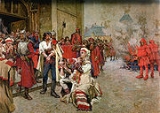
Matija Gubec
Encyclopedia

Croatia
Croatia , officially the Republic of Croatia , is a unitary democratic parliamentary republic in Europe at the crossroads of the Mitteleuropa, the Balkans, and the Mediterranean. Its capital and largest city is Zagreb. The country is divided into 20 counties and the city of Zagreb. Croatia covers ...
n peasant and a revolutionary, best known as the leader of the Croatian-Slovenian peasant revolt. Before the revolt, Gubec was a serf on the estate of the landowner Franjo Tahy.
When the revolt erupted, the peasants elected Matija Gubec to be one of the leaders, and renowned for his personal qualities, he became the most influential leader of the rebellion. During his brief tenure he showed ability as a capable administrator and inspiring leader that would later create a legend. He earned the nickname Gubec Beg
Bey
Bey is a title for chieftain, traditionally applied to the leaders of small tribal groups. Accoding to some sources, the word "Bey" is of Turkish language In historical accounts, many Turkish, other Turkic and Persian leaders are titled Bey, Beg, Bek, Bay, Baig or Beigh. They are all the same word...
.
Matija Gubec led the peasant army during its last stand at the Battle of Stubičko Polje on 9 February 1573. Before the battle he made a speech trying to convince the men that only victory could bring them freedom, while the defeat would bring more misery. After the defeat he was captured and taken to Zagreb
Zagreb
Zagreb is the capital and the largest city of the Republic of Croatia. It is in the northwest of the country, along the Sava river, at the southern slopes of the Medvednica mountain. Zagreb lies at an elevation of approximately above sea level. According to the last official census, Zagreb's city...
. On 15 February, he was publicly tortured, forced to wear a red-hot iron crown and was subsequently quartered.
While Matija Gubec's cause was defeated, his legacy continued to be preserved in local folklore throughout the centuries. In the 20th century, Josip Broz Tito
Josip Broz Tito
Marshal Josip Broz Tito – 4 May 1980) was a Yugoslav revolutionary and statesman. While his presidency has been criticized as authoritarian, Tito was a popular public figure both in Yugoslavia and abroad, viewed as a unifying symbol for the nations of the Yugoslav federation...
and the Yugoslav Partisans embraced his cause as their own. During World War II, a Croatian and a Slovenian Partisan brigade were named after him. He is also depicted as the protagonist of Gubec Beg, one of the first rock opera
Rock opera
A rock opera is a work of rock music that presents a storyline told over multiple parts, songs or sections in the manner of opera. A rock opera differs from a conventional rock album, which usually includes songs that are not unified by a common theme or narrative. More recent developments include...
s in modern Croatia. A museum of Croatian-Slovenian peasant revolt led by him is founded in Oršić Castle in Gornja Stubica
Oršić Castle in Gornja Stubica
Oršić Castle is a baroque castle in the Gornja Stubica municipality, Krapina-Zagorje County, northwestern Croatia.-History:It was built in 1756 by Croatian count Krsto Oršić // on the site of a previous fortress from the Middle Ages and designed in L-shaped ground plan...
, near the place of his last battle.

